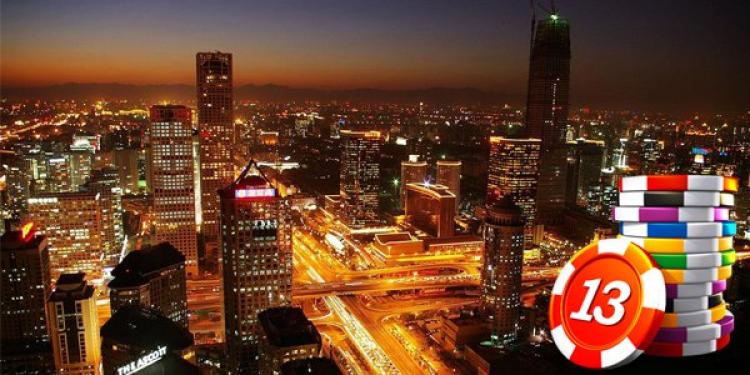How Beijing Millions Proves that the Asia-Pacific Poker Tour is Tapping the World’s Biggest Market
Posted: August 1, 2014
Updated: October 4, 2017

How does a country without any legal forms of gambling host the biggest-ever real money poker tournament outside of the US? Here’s how.
Last week the Beijing Millions poker tournament was held in the People’s Republic of China made unprecedented gambling news. 2,732 people put up to $480 buy-in to enter the tournament, making it the largest-ever poker event held outside the United States, topping anything held in the UK, Europe or Latin America.
The tournament, put on by the Asia-Pacific Poker Tour, was won by amateur Chen Qin, who pocketed a cool $105,000. While it may be a huge sum compared to the million-dollar pots seen in high-stakes tournaments in the US and Europe, one must consider how far the Asian market has come in a short amount of time.
Asia-Pacific Poker Tour Launched in 2007
When PokerStars president Jeffrey Hass and director of marketing Sarne Lightman looked over to the Asia-Pacific region, they saw more than one quarter of the globe’s population; an immense group of people who already have an interest in casino gambling.
• 2,732 people entered the Beijing Millions poker tournament, making it the biggest non-US tournament ever
• Poker is picking up popularity in China and across the Asia-Pacific
• The Chinese government still bans all forms of China
Poker is a western game, but it has shown an impressive ability to market itself in other parts of the globe. If Chinese, Korean and Vietnamese gamblers love games like paigow and baccarat, why shouldn’t they enjoy poker as well? Seeing a huge market, these poker entrepreneurs launched the Asia-Pacific Poker Tour in 2007, a brother organization of the American, European and Latin American Poker Tours.
The tour started off with a bang. In November 2007 it held the Asian Poker Open in Macau, the first-ever poker tournament to be held in what is now the world’s main gambling city. If you can put on a big gambling event in Macau, you can put on a big gambling event anywhere.
Interest continued to pick up. Soon after the inaugural event PokerStars organized real-money events in the People’s Republic of China and South Korea, the first ever tournaments to be held in either country. They held a second tournament in Macau in 2008 which received 538 entrants, making it the largest poker event ever in Asia at the time.
Poker events in the land of illegal casinos
While gambling hotbed Macau is officially part of the People’s Republic of China, mainland Chinese gambling laws are very restrictive in general. There are no legal casinos or card rooms, and online gambling is illegal as well. No matter, the authorities have had no problem allowing major international poker tournaments to take place there.
In 2012 and 2013 the World Poker Tour held major cash tournaments on the island of Hainan in the South China Sea, and those paled in comparison to the massive Beijing Millions.
APPT president Danny McDonagh called it a raving success and that the record number of contestants could make it a watershed moment in developing poker’s popularity in China: “the result greatly exceeded our wildest expectations… It’s been a historical week. Not just the record itself, but how it may change the future landscape for poker in China.”
Jian Yang of the Beijing Sports Competitions Administration Center – the government-sponsored organization which co-organized the event – also touted it as a huge success: “together we created a miracle with the Beijing Millions. I hope the cooperation between APPT and Star Poker will strengthen and develop poker further in China.”
China’s huge population and status as a regional powerhouse means that promoting poker in Asia essentially means promoting poker in China. The only complication? All forms of gambling remain illegal on the Chinese mainland.
Will the Chinese authorities legalize it?
Allowing the largest ever non-US tournament to be held in the capital city of one of the world’s most anti-gambling countries doesn’t seem to make sense, on the surface.In fact, it’s incomprehensible. The only explanation is that it shows how far the authorities are willing to go to bring foreign investment into the country.
And while other tournaments had been held in Macau and Hainan, both are distant provinces in the South China Sea, resort destinations which are inaccessible to the average Chinese. The Beijing Millions was a major step, considering that it was allowed to take place in China’s capital and largest city.
Are the authorities encouraging people to gamble? Certainly not intentionally, but a large event like that is certain to pique the interest of many. Will the government legalize Chinese poker rooms anytime in the foreseeable future? There are no indications that officials in Beijing intend to do that. But 2,732 Chinese put in money to enter the tournament, which something that can’t be ignored.
Holding a high-profile tournament is a great way to promote the game among potential players, which is exactly what PokerStars had in mind. Even if a small percentage of China’s massive population grows an interest in real-money poker, it will create a huge market for PokerStars that will become increasingly difficult for the Chinese authorities to keep a lid on.
The Chinese government has proven resilient in the face of pressure but now that poker has entered society, there is a risk that the trickle will turn into a flood. If enough Chinese want to play poker, whether it be in illegal casinos, underground card rooms, or online gambling sites based overseas, they will, whether the authorities sanction it or not.












